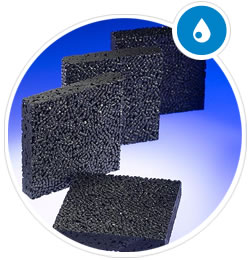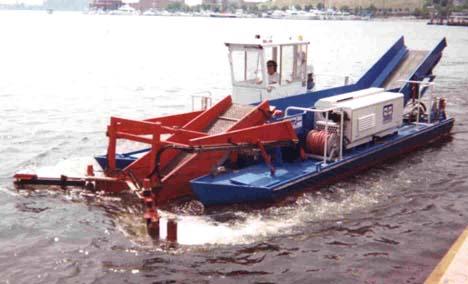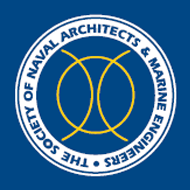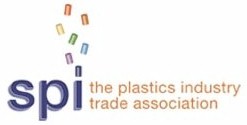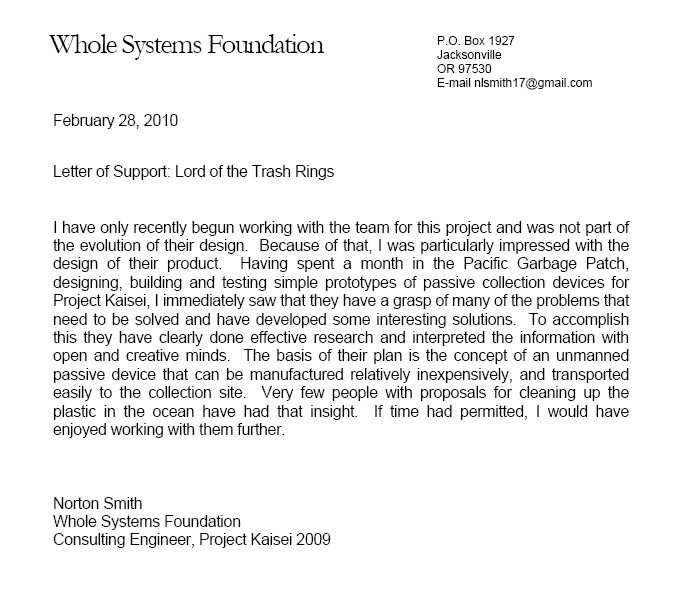|
Mainland High School
Lord of the Trash Rings: ISTF 09-2004 |
||||||||||||||
|
Home
Introduction Contest Components One Two  Product Product
Three Background Environmentalism History of Plastics Marine Laws Plastic Properties Pollution Laws Research Groups The Oceans Waste Management Project Assessment Team |
Component Two
Identify two companies and one product produced by each company that directly relate
to the NCT technical application your team has selected.
 United Marine International,
UMI, is a company with the solution to marine pollution at the top of their priority
list. UMI, started in the late 1970's, is currently the
world's top producer of trash skimmers for clean-up purposes. The first
application of their products was for
weed and branch clean-up but after numerous customer suggestions and accumulating
resources they introduced a new line of skimmers in the 1980's with the sole purpose
of cleaning up trash
and debris. Currently 70+ trash skimmers are being used
internationally. The products produced by UMI have been showcased on
Mega Machines
and have saved harbors
in cities such as Chicago,
New York, and even as far out as Hong Kong. Their largest TrashCat, the
12000 Series, is 16 feet wide by 2.5 feet deep and can store up to 12,000 pounds
or 700 cubic feet of debris.
United Marine International,
UMI, is a company with the solution to marine pollution at the top of their priority
list. UMI, started in the late 1970's, is currently the
world's top producer of trash skimmers for clean-up purposes. The first
application of their products was for
weed and branch clean-up but after numerous customer suggestions and accumulating
resources they introduced a new line of skimmers in the 1980's with the sole purpose
of cleaning up trash
and debris. Currently 70+ trash skimmers are being used
internationally. The products produced by UMI have been showcased on
Mega Machines
and have saved harbors
in cities such as Chicago,
New York, and even as far out as Hong Kong. Their largest TrashCat, the
12000 Series, is 16 feet wide by 2.5 feet deep and can store up to 12,000 pounds
or 700 cubic feet of debris.
Due to our project's emphasis on plastic pollution, we have included a third company
which consults on increasing the efficiency of processing and recycling plastics.
 Nextek Limited,
a consulting company with
offices in London and Australia, specializes in the field of "design, optimization, processing and recycling of polymeric materials". Nextek Limited,
a consulting company with
offices in London and Australia, specializes in the field of "design, optimization, processing and recycling of polymeric materials".Nextek's vision is a world where all plastics are biodegradable and are used responsibly to prevent pollution in the world. This group is not just dreaming about this idea, but trying their best to make it reality through the research of better ways to shrink the impact made by plastic usage and creating environmentally-friendly innovations that aid in efficient plastic manufacturing. Nextek strives to make other companies aware of what is required in order for an ideal future where Earth's resources are still abundant. Nextek's services focus on: high performance recycling, sustainable packaging, and a Polymer expertise used to improve global plastic designs daily. Progress has earned them multiple awards ranging from: EDIE Award for Environmental Excellence, The Plastics Industry Awards 2007 finalist spot, and a Gold-'Best Use of Innovative Materials' at the Starpack Packaging Awards of 2007. Their current projects include working on products such as the development of a PET recycling plant for Closed Loop London and the creation of a new FDA Food Grade PET Recycling Process. Nextek Limited's strong zeal for pollution prevention is coupled with its desire to efficiently use raw materials and increasingly scare resources to create a better life for the people of this planet.
Identify one professional association or trade organization associated with the
products your team identified.
Include:  its name, its name,
 description of its mission, and description of its mission, and
 number of people/companies involved. number of people/companies involved.
Since our primary focus is on plastics and plastic pollution, we thought it appropriate
to also cite the following second organization.
Propose and describe a new product or new process based on your team's NCT technical
application.
Our product is a stationary, yet portable, array of artificial
harbors whose purpose is to passively collect floating plastic and other debris
carried by the ocean's currents.
Via the Internet, locate a company that might be able to manufacture your team's
proposed product. Send the company an e-mail asking that someone in the company
evaluate the product your team proposed. If your team is not able to obtain a response
to your inquiry, provide on your website an example of the e-mail request you sent
and the names of manufacturers to whom you sent the request.
During the months of January and February, we sent emails to six plastic companies
asking for their assistance. One company responded by saying that they did not have
the man power to dedicate time to our project. The other five companies did not
respond at all. Our email was sent to all of their listed online contact addresses. In
each request we highlighted one of their products with a link to their website as
well as a link to our product page and the following four questions:
At the end of project, we received this phenomenal letter from our adviser Norton Smith. Mr. Smith was a consulting engineer on Project Kaisei and designs collection devices. In his email he stated that his role on Kaisei was, unfortunately, more often one of "trouble shooting the mechanical, electrical, and plumbing systems that were habitually breaking down." Needless-to-say, the team cheered when they read his assessment of our product. Bioplastics Council http://www.plasticsindustry.org/BPC/ EPA Issues Report on Effectiveness of Marine Trash Skimmers http://www.trashskimmer.com/epa-report.htm Nextek Ltd http://www.nextek.org/index.html Nextek Ltd About Us http://www.nextek.org/aboutus.html Nextek Ltd Contact Us http://www.nextek.org/contact.html Nextek Ltd Services http://www.nextek.org/services.html Nextek Ltd Vision http://www.nextek.org/vision.html NPE2009 Schedule at a Glance http://www.npe.org/attendee/attend/schedule.asp Ocean Alternative Energy http://www.snameexpo.com/2009/pdf/OceanEnergyPanel.pdf Porex http://www.porex.com/index.cfm Porex Corporate Info http://www.porex.com/corporate.cfm Porex Locations http://www.porex.com/locations.cfm Porex Material Technology http://www.porexfiltration.com/Tubular_Membrane/tech1.html Porex Product Info http://www.porexfiltration.com/Tubular_Membrane/product1.html#3 Sand Bed Filter Support http://www.porex.com/by_market/by_market_industrial/sand_bed.cfm SNAME 2009 Annual Meeting and Expo http://www.snameexpo.com/2009/home/ SNAME The Society http://www.sname.org/SNAME/SNAME/TheSociety/Default.aspx SPI at a Glance http://www.plasticsindustry.org/AboutSPI/content.cfm?ItemNumber=507&navItemNumber=1108 SPI Environment Policy http://www.plasticsindustry.org/PublicPolicy/content.cfm?ItemNumber=2441&navItemNumber=1603 SPI Members http://www.plasticsindustry.org/membership/directory/results.cfm?keywords=&x=47&y=7&state= SPI Policy Statement on Degradable Plastics http://www.plasticsindustry.org/PublicPolicy/content.cfm?ItemNumber=864&navItemNumber=1603 SPI Policy Statement on Product Stewardship http://www.plasticsindustry.org/PublicPolicy/content.cfm?ItemNumber=872&navItemNumber=1603 SPI Resin Identification Code - Guide to Correct Use http://www.plasticsindustry.org/AboutPlastics/content.cfm?ItemNumber=823 The International Plastics Showcase http://www.npe.org/ The Society of Naval Architects and Marine Engineers http://www.sname.org/SNAME/SNAME/Home/ The Society of the Plastics Industry http://www.plasticsindustry.org/ TrashCat™ Systems Summary http://www.trashskimmer.com/trashcat.htm United Marine International http://www.trashskimmer.com/ UMI News http://www.trashskimmer.com/news.htm UMI Overview, Profile, and Affiliates http://www.trashskimmer.com/profile.htm UMI Videos http://www.trashskimmer.com/videos/videos.htm UMI Worldwide Applications http://www.trashskimmer.com/worldsol.htm Unmanned and Autonomous Ships of the Future http://www.snameexpo.com/2009/pdf/AutonShipsPanelFinal2.pdf WeedCat™ Systems Summary http://www.trashskimmer.com/weedcat.htm |
|||||||||||||

